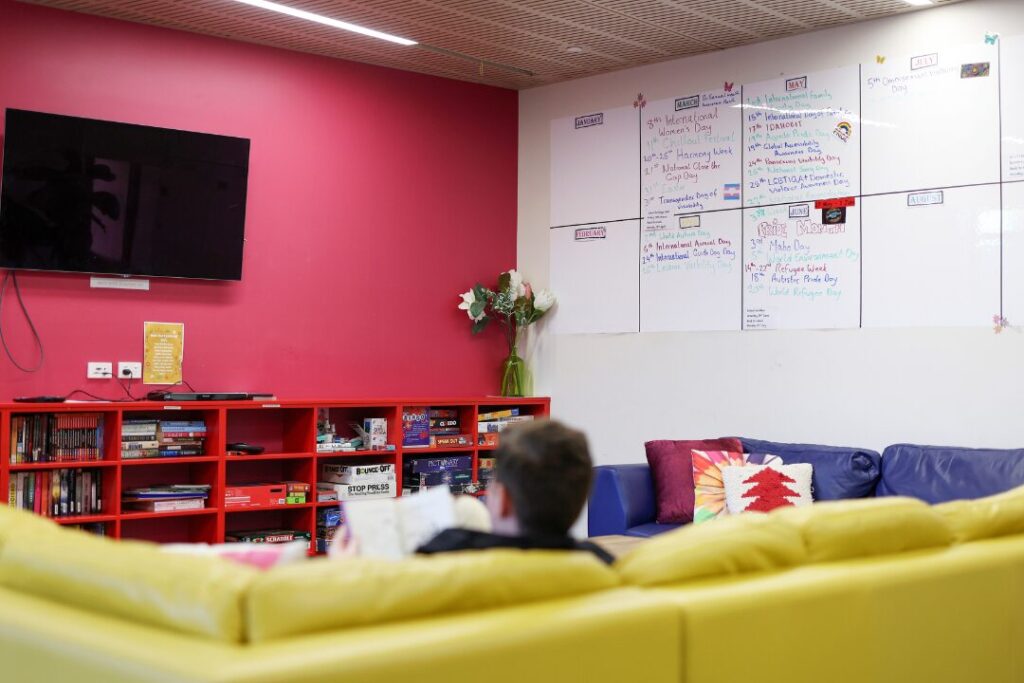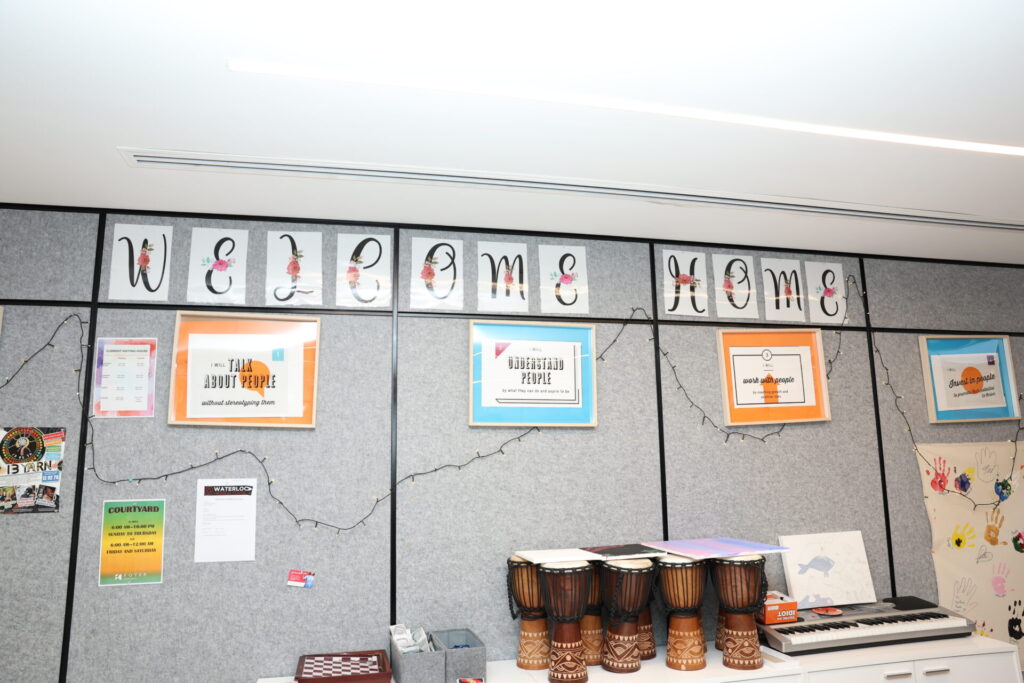How a philanthropic consortium is helping young people out of homelessness

A Foyer Foundation initiative with Hand Heart Pocket and others resulted in the Queensland government committing to eight new foyers that provide youth homelessness accommodation and support services. Here, we look at how the collaboration between a consortium of philanthropists, impact investors and service providers worked. And explore the broader impact of the foundation’s model supporting young people experiencing homelessness into stable housing, employment and education around Australia.
In French, ‘foyer’ is the term for hearth, and that special sense of home and belonging. And in Australia, Youth Foyers are precisely that for many vulnerable young people: a safe space they can call their own, where they have housing and support for education, employment, and life skills under one roof.
Youth Foyers originated in France more than 30 years ago and spread to the UK and the US before emerging in Australia in the early 2000s. Today, Youth Foyers – self-contained units with communal living spaces – are in most states and territories and provide a home for up to two years for people aged 16 to 24 experiencing or at risk of homelessness.

The Foyer Foundation is a national organisation that works with community housing providers, education and employment services, philanthropists and impact investors. Together, the partners are achieving extraordinary things, including funding commitments from state and federal governments, with Queensland in particular moving rapidly thanks to the creative input of Hand Heart Pocket, an independent charity and philanthropic foundation.
The Foyer Foundation established FoyerInvest, a consortium of not-for-profits, investors and philanthropists working toward the goal of 50 Accredited Youth Foyers in Australia by 2030. Hand Heart Pocket initiated FoyerInvest’s Queensland Working Group, a unique advocacy collaboration. The group brought together the six youth services and community housing providers already expert in delivering Foyers, along with Foyer tenants, with the aim of advocating for more in the state.
This initiative has resulted in a significant commitment from the Queensland state government that was announced earlier in 2024.

Hand Heart Pocket CEO and Co-Chair of the Queensland FoyerInvest Working Group, Sara Parrott, says the Queensland Government’s decision to fund eight new foyers was an enormous win that highlighted the importance of collaboration in achieving system change.
Sara became aware of Youth Foyers in 2022 when she was looking for opportunities for Hand Heart Pocket to invest in activities that would have positive outcomes for young people in Queensland.
“We went to a Foyer conference on the Gold Coast and met different organisations wanting to set up Foyers – but we knew we couldn’t have separate organisations going to the government to ask for funding,” Sara said. “We invited everybody to discuss how we could talk to the Queensland Department of Housing and Treasury’s social impact investing teams about building more Foyers.
“It was perfect timing because Foyer Foundation was about to publish a study that showed what the payback was to governments for investing in a foyer. We dubbed ourselves the Queensland FoyerInvest Working Group.”
Along with Hand Heart Pocket and Foyer Foundation, the working group also includes Mission Australia, Wesley Mission Queensland, Gold Coast Youth Service, The Y (YMCA Queensland), Brisbane Youth Service, Q-Shelter and IFYS.
Hand Heart Pocket then invested $250,000 in Foyer Foundation’s capacity to run state and federal government relations and supported the working group in preparing a combined pitch to the Queensland Government.

“We spent 2023 as a working group talking to the Department of Housing. Then the stars aligned when a new Minister and Director-General came on board, met with the young people who live in Foyers and were convinced by the social return and said, ‘yes, this will work’,” Sara says.
“The advocacy culminated in an announcement in February 2024 within the new Queensland housing plan of not six but eight foyers. Our $250,000 grant turned into about $320 million worth of commitment by the Queensland government for social housing for young people in Queensland.”
The Foyer Foundation continues to build awareness of the model, using its research that shows 80% of people exit from Youth Foyers into safe and stable housing and 65% gain decent work, and most progress their education.
Liz Cameron-Smith has seen significant growth in the Foyer model across Australia since she joined as the CEO of The Foyer Foundation in mid-2022. She explains that the Australian beginnings in 2008 came after a group led by Narelle Clay, CEO of Southern Youth and Family Services, travelled to the UK to learn about the model. They brought the best parts of the approach to Australia.
Youth Foyers are much more than supported accommodation or a welfare program. They use an ‘Advantaged Thinking’ approach, meaning Foyers tap into the ambitions of young people and nurture their talents while building life skills.
The voices of empowered young people are an important part of FoyerInvest’s advocacy work. “These young people have travelled to Canberra with us, met with the Offices of the PM, the Treasurer, the Housing Minister, MPs and advisors, and engaged with state and territory governments,” Liz says. “They shared deeply personal stories about their lives and the way Youth Foyers offered them a launchpad for the future.
“Governments have also realised Youth Foyers will save them money by increasing employment and [the number of] taxpaying citizens, decreasing dependence on welfare, housing and justice services, and breaking cycles of intergenerational disadvantage.”
There has been a dramatic increase in demand for Youth Foyers across Australia in recent years. Currently, there are more than 630 units across 16 Accredited Youth Foyers, with 11 more under construction or accreditation. A further 33 communities are seeking investment for new Youth Foyers.
“On average, 44,000 young people asked for support from homelessness services every year for the last decade,” Liz says. “As a nation, we are not doing enough to break intergenerational cycles of homelessness and provide young people with the pathways they need. The model is based on the proposition that the most constructive thing we can do for young people is to ensure they become educated, employable and empowered.”
As a nation, we are not doing enough to break intergenerational cycles of homelessness and provide young people with the pathways they need.
A partnership with the Paul Ramsay Foundation commencing in 2021 provided the Foyer Foundation with essential seed funding to accelerate the growth and impact of Foyers in Australia.
“The seed funding meant we could mature and evolve as an independent entity that connects the Australian Youth Foyer network, provides quality assurance, knowledge sharing and capability building, and the first national outcomes framework for Youth Foyers,” Liz says.
The funding for Foyers in Cairns, Hervey Bay, and the Moreton Bay region (with more locations to be confirmed) means people such as Caitlyn, who lives in Wesley Mission Queensland’s Logan Youth Foyer, can continue to look forward to positive futures.
“Foyer has given me stability, opportunity and a safe place to express myself and become a better version of myself,” Caitlyn says.
“I’ve been able to gain employment and a vehicle, and I have participated in volunteering opportunities. I’ve also learnt how important it is to use my own voice to advocate for other young people experiencing homelessness, and I’ve realised that I would love to pursue a career in community services.
“It feels good to have an impact on the future of youth homelessness and be a voice for other young people – I’m proud that I can use my story to influence change and impact my community.”
